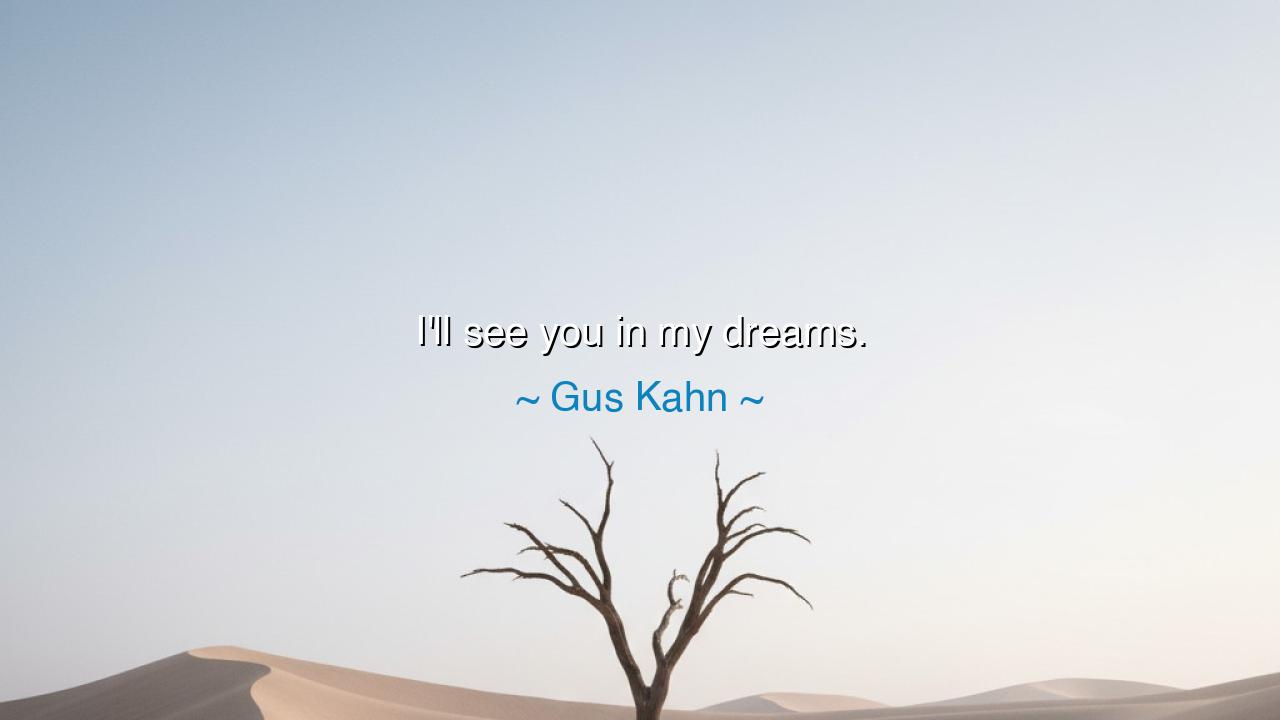
I'll see you in my dreams.






When Gus Kahn, the lyricist of an age when music was woven with longing and tenderness, wrote the simple yet eternal words, “I’ll see you in my dreams,” he gave voice to one of the most profound truths of the human heart: that love, once felt deeply, never truly vanishes. This phrase, born from his 1924 song of the same name, is not just a farewell—it is a promise that affection, memory, and spirit transcend the boundaries of time and space. Kahn’s words, though wrapped in the softness of song, carry the weight of ancient wisdom: that even when life separates us, the soul remembers.
The song “I’ll See You in My Dreams,” written by Gus Kahn with music by Isham Jones, was first sung in an age when the world was recovering from war and loss. Families and lovers across the oceans clung to memories as the only bridge between hearts divided by distance or death. In that time, Kahn’s words were a balm—a reminder that though the body fades, the spirit endures in dreams, those sacred realms where time has no dominion. Dreams, to the poet, were not mere illusions, but portals to the eternal, where the living and the lost might meet again in the silent language of the heart.
To the ancients, this idea was as old as humanity itself. The Greeks believed that in sleep, the soul wandered between the mortal and divine worlds, visiting places unreachable by waking thought. In the Bible, dreams were seen as messages from the divine, whispers of truth from beyond the veil. Kahn’s words, though born in the modern age, carry this same timeless faith: that love transcends separation, and that in the quiet of the night, when all is still, hearts divided by circumstance may yet find one another again.
One might remember the story of Queen Victoria and her love for Prince Albert. When he died, she wore mourning black for the rest of her days, unable to let go of his presence. Yet in her journals, she wrote that he still came to her in dreams—that he walked beside her in gardens unseen, that his voice whispered comfort where silence might have broken her. To her, as to Kahn, the dream was not a shadow but a continuation of love, proof that affection once kindled cannot be extinguished by death, distance, or time.
In the words “I’ll see you in my dreams,” there is both grief and grace. It is an acknowledgment of parting—of the human pain of absence—but also a refusal to surrender to despair. The dream becomes the sanctuary of the soul, where remembrance heals and longing finds peace. Through dreams, memory becomes presence, and what was once lost is found anew. This is not mere sentimentality—it is a truth that those who have loved deeply know in their bones. The heart, even when broken, continues to reach beyond the horizon of loss, seeking reunion in the mysterious realms of sleep and spirit.
Kahn’s simple lyric also speaks to hope, the quiet resilience that defines love’s endurance. To say “I’ll see you in my dreams” is to believe that connection is not confined to waking hours. It is to affirm that love, in its highest form, is a spiritual force that no distance can break. Just as the sun continues to shine beyond the clouds, love continues to exist beyond separation. And when the night comes, when the world grows quiet and the eyes close, that love returns—softly, gently—reminding us that we are never truly alone.
Let this teaching, then, be carried like a lantern through life’s darker corridors: love endures beyond parting. When we lose those dear to us—through death, through distance, or through the changing tides of time—we may still find them in the dreams of the heart. Do not fear the night; it is not emptiness, but a meeting place between worlds. Cherish your memories, for they are the bridges through which the spirit crosses to the eternal. And when you whisper to someone, “I’ll see you in my dreams,” speak it not with sorrow, but with faith—for it is the oldest and truest promise of love: that nothing, not even the boundaries of life itself, can keep two souls apart who were meant to find each other again.
Thus, Gus Kahn’s immortal phrase lives on—not as a relic of song, but as a prayer for all who have loved and lost. For in the end, every heart that dares to love deeply must learn this truth: though the world may divide us in the light of day, love reunites us in the quiet sanctuaries of the soul—and there, in the sacred silence of our dreams, we meet again.






AAdministratorAdministrator
Welcome, honored guests. Please leave a comment, we will respond soon